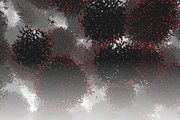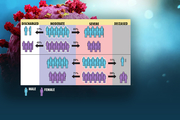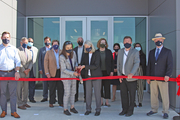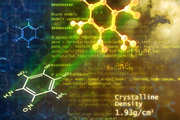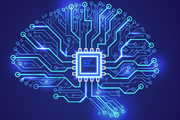Did you know we have a monthly newsletter? View past volumes and subscribe.
Paving the way to tailor-made carbon nanomaterials and more accurate energetic materials modeling
March 17, 2022 -
To better understand how carbon nanomaterials could be tailor-made and how their formation impacts shock phenomena such as detonation, LLNL scientists conducted machine-learning-driven atomistic simulations to provide insight into the fundamental processes controlling the formation of nanocarbon materials, which could serve as a design tool, help guide experimental efforts and enable more...
Machine learning model finds COVID-19 risks for cancer patients
March 10, 2022 -
A new study by researchers at LLNL and the University of California, San Francisco, looks to identify cancer-related risks for poor outcomes from COVID-19. Analyzing one of the largest databases of patients with cancer and COVID-19, the team found previously unreported links between a rare type of cancer—as well as two cancer treatment-related drugs—and an increased risk of hospitalization...
LLNL team models COVID-19 disease progression and identifies risk factors
Feb. 15, 2022 -
An LLNL team has developed a comprehensive dynamic model of COVID-19 disease progression in hospitalized patients, finding that risk factors for complications from the disease are dependent on the patient’s disease state. Using a machine learning algorithm on a dataset of electronic health records from more than 1,300 hospitalized COVID-19 patients with ProMedica — the largest health care...
Understanding materials behavior with data science (VIDEO)
Dec. 21, 2021 -
Computational chemist Rebecca Lindsey, PhD, explains how machine learning and data science techniques are used to develop diagnostic tools for stockpile stewardship, such as models that predict detonator performance. Lindsey also describes how atomistic simulations improve researchers’ understanding of the microscopic phenomena that govern the chemistry in materials under extreme conditions...
Building better materials with data science (VIDEO)
Nov. 11, 2021 -
Research engineer Brian Giera, PhD, describes how data science techniques help collect and analyze data from advanced manufacturing processes in order to craft meaningful experiments. With examples of automated microencapsulation, 3D nanoprinting, metal additive manufacturing, laser track welding, and digital twins, Giera explains how interdisciplinary teams apply machine learning to remove...
Building confidence in materials modeling using statistics
Oct. 31, 2021 -
LLNL statisticians, computational modelers, and materials scientists have been developing a statistical framework for researchers to better assess the relationship between model uncertainties and experimental data. The Livermore-developed statistical framework is intended to assess sources of uncertainty in strength model input, recommend new experiments to reduce those sources of uncertainty...
LLNL joins Human Vaccines Project to accelerate vaccine development and understanding of immune response
Oct. 21, 2021 -
LLNL has joined the international Human Vaccines Project (HVP), bringing Lab expertise and computing resources to the consortium to aid development of a universal coronavirus vaccine and improve understanding of immune response. The HVP is a nonprofit, public-private partnership with a mission to decode the human immune system and accelerate the development of vaccines and immunotherapies...
Summer scholar develops data-driven approaches to key NIF diagnostics
Oct. 20, 2021 -
Su-Ann Chong's summer project, “A Data-Driven Approach Towards NIF Neutron Time-of-Flight Diagnostics Using Machine Learning and Bayesian Inference,” is aimed at presenting a different take on nToF diagnostics. Neutron time-of-flight diagnostics are an essential tool to diagnose the implosion dynamics of inertial confinement fusion experiments at NIF, the world’s largest and most energetic...
Tackling the COVID-19 pandemic
Oct. 11, 2021 -
To help the U.S. fight the COVID-19 pandemic, LLNL did what it does best: quickly bring together interdisciplinary teams and diverse technologies to address urgent national challenges. This effort includes applying advanced high-performance computing resources to biological research and anayzing complicated computer models and enormous datasets. Read more in Science & Technology Review.
Data Science Challenge welcomes UC Riverside
Oct. 11, 2021 -
Together with LLNL’s Center for Applied Scientific Computing (CASC), the DSI welcomed a new academic partner to the 2021 Data Science Challenge (DSC) internship program: the University of California (UC) Riverside campus. The intensive program has run for three years with UC Merced, and it tasks undergraduate and graduate students with addressing a real-world scientific problem using data...
Inaugural industry forum inspires ML community
Sept. 16, 2021 -
LLNL held its first-ever Machine Learning for Industry Forum (ML4I) on August 10–12. Co-hosted by the Lab’s High-Performance Computing Innovation Center (HPCIC) and Data Science Institute (DSI), the virtual event brought together more than 500 enrollees from the Department of Energy (DOE) complex, commercial companies, professional societies, and academia. Industry sponsors included...
Visualization software stands the test of time
Sept. 13, 2021 -
In the decades since LLNL’s founding, the technology used in pursuit of the Laboratory’s national security mission has changed over time. For example, studying scientific phenomena and predicting their behaviors require increasingly robust, high-resolution simulations. These crucial tasks compound the demands on high-performance computing hardware and software, which must continually be...
LLNL, NNSA and elected officials celebrate opening of Livermore Valley Open Campus expansion
Aug. 26, 2021 -
Leaders from the NNSA, Congressional representatives and local elected officials gathered at LLNL on August 10 to celebrate an expansion to the Livermore Valley Open Campus (LVOC). The Lab hosted a ribbon-cutting ceremony for a new office building (Bldg. 642) and a conference annex (Bldg. 643), which will provide modern office and meeting space for LLNL researchers in predictive biology...
Brian Gallagher combines science with service
June 20, 2021 -
Brian Gallagher works on applications of machine learning for a variety of science and national security questions. He’s also a group leader, student mentor, and the new director of LLNL’s Data Science Challenge. The Lab has enabled Gallagher to combine scientific pursuits with leadership positions and people-focused responsibilities. “For a long time, my primary motivation was learning new...
Machine learning aids in materials design
June 10, 2021 -
A long-held goal by chemists across many industries is to imagine the chemical structure of a new molecule and be able to predict how it will function for a desired application. In practice, this vision is difficult, often requiring extensive laboratory work to synthesize, isolate, purify, and characterize newly designed molecules to obtain the desired information. Recently, a team of LLNL...
COVID-19 detection and analysis with Nisha Mulakken (VIDEO)
June 7, 2021 -
LLNL biostatistician Nisha Mulakken has enhanced the Lawrence Livermore Microbial Detection Array (LLMDA) system with detection capability for all variants of SARS-CoV-2. The technology detects a broad range of organisms—viruses, bacteria, archaea, protozoa, and fungi—and has demonstrated novel species identification for human health, animal health, biodefense, and environmental sampling...
Laser-driven ion acceleration with deep learning
May 25, 2021 -
While advances in machine learning over the past decade have made significant impacts in applications such as image classification, natural language processing and pattern recognition, scientific endeavors have only just begun to leverage this technology. This is most notable in processing large quantities of data from experiments. Research conducted at LLNL is the first to apply neural...
The data-driven future of extreme physics
May 19, 2021 -
By applying modern machine learning and data science methods to “extreme” plasma physics, researchers can gain insight into our universe and find clues about creating a limitless amount of energy. In a recent perspective published in Nature, LLNL scientists and international collaborators outline key challenges and future directions in using machine learning and other data-driven techniques...
Advanced Data Analytics for Proliferation Detection shares technical advances during two-day meeting
May 7, 2021 -
The Advanced Data Analytics for Proliferation Detection (ADAPD) program held a two-day virtual technical exchange meeting recently. The goal of the meeting was to highlight the science-based and data-driven analysis work conducted by ADAPD to advance the state-of-the-art to accelerate artificial intelligence (AI) innovation and develop AI-enabled systems to enhance the United States’...
A winning strategy for deep neural networks
April 29, 2021 -
LLNL continues to make an impact at top machine learning conferences, even as much of the research staff works remotely during the COVID-19 pandemic. Postdoctoral researcher James Diffenderfer and computer scientist Bhavya Kailkhura, both from LLNL’s Center for Applied Scientific Computing, are co-authors on a paper—“Multi-Prize Lottery Ticket Hypothesis: Finding Accurate Binary Neural...

